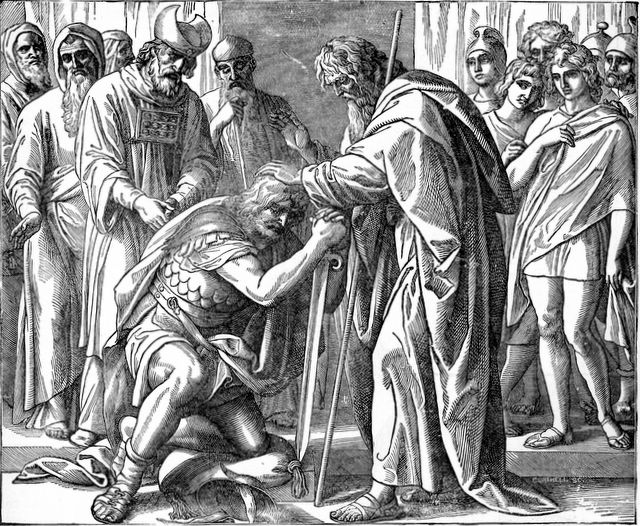
Moses Appoints Joshua: illustration from Henry Davenport Northrop’s 1894 Treasures of the Bible [public domain / Wikimedia Commons]
*****
Titus 1:5-7 (RSV) This is why I left you in Crete, that you might amend what was defective, and appoint elders in every town as I directed you, [6] if any man is blameless, the husband of one wife, and his children are believers and not open to the charge of being profligate or insubordinate. [7] For a bishop, as God’s steward, must be blameless; he must not be arrogant or quick-tempered or a drunkard or violent or greedy for gain,
Acts 20:17 And from Mile’tus he sent to Ephesus and called to him the elders of the church.
Acts 20:28 [Paul talking to these elders] Take heed to yourselves and to all the flock, in which the Holy Spirit has made you overseers [episkopos = “bishop”], to care for the church of God which he obtained with the blood of his own Son.
1 Peter 5:1 So I exhort the elders among you, as a fellow elder and a witness of the sufferings of Christ as well as a partaker in the glory that is to be revealed. (cf. 1:1: “apostle”)
We know from history that Peter was the first bishop of Rome. Thus, he exhibits apostolic succession in his own person. And that gets into the papacy as well.
Likewise, St. Paul the apostle calls himself a diakonos [deacon] at least seven times (1 Cor 3:5; 2 Cor 3:6; 6:4; 11:23; Eph 3:7; Col 1:23, 25: “minister” in KJV; “minister” or “servant” in RSV: Strong’s word #1249). If Paul calls himself a deacon: an even lower office, then an apostle can certainly be an elder or bishop. And he wrote:
2 Timothy 1:11 For this gospel I was appointed a preacher and apostle and teacher,
Jesus Himself recognized succession of teachers, even among the non-Christian Pharisees (an early form or type of apostolic succession):
Matthew 23:2-3 “The scribes and the Pharisees sit on Moses’ seat; [3] so practice and observe whatever they tell you, but not what they do; for they preach, but do not practice.
They had authority — even when hypocrites, and even over Christians — and they did because they were in an office of succession that went back to Moses (implied by “so” in the text). Moreover, the notion of “Moses’ seat” is not found in the Old Testament, but we know it must have existed, because Jesus said it. If even Pharisees, then, have a succession of teaching office going all the way back to Moses, so Christians can and ought to have apostolic succession.
Deuteronomy 34:9-12 And Joshua the son of Nun was full of the spirit of wisdom, for Moses had laid his hands upon him; so the people of Israel obeyed him, and did as the LORD had commanded Moses. [10] And there has not arisen a prophet since in Israel like Moses, whom the LORD knew face to face, [11] none like him for all the signs and the wonders which the LORD sent him to do in the land of Egypt, to Pharaoh and to all his servants and to all his land, [12] and for all the mighty power and all the great and terrible deeds which Moses wrought in the sight of all Israel.
Additionally, the Levites were a priestly and teaching class in the old covenant (2 Chr 35:3; Neh 8:9). They obviously had succession, by the very fact that it was one tribe that had these duties. This went on for many hundreds of years.
It’s not just in the Old Testament that this occurs. It certainly appears as if Paul is passing on his office to Timothy (his “true child in the faith”: 1 Tim 1:2), also:
2 Timothy 1:6 Hence I remind you to rekindle the gift of God that is within you through the laying on of my hands;
2 Timothy 1:13-14 Follow the pattern of the sound words which you have heard from me, in the faith and love which are in Christ Jesus;
[14] guard the truth that has been entrusted to you by the Holy Spirit who dwells within us.2 Timothy 2:1-2 You then, my son, be strong in the grace that is in Christ Jesus, [2] and what you have heard from me before many witnesses entrust to faithful men who will be able to teach others also.2 Timothy 3:14 But as for you, continue in what you have learned and have firmly believed, knowing from whom you learned it*2 Timothy 4:1-6 I charge you in the presence of God and of Christ Jesus who is to judge the living and the dead, and by his appearing and his kingdom: [2] preach the word, be urgent in season and out of season, convince, rebuke, and exhort, be unfailing in patience and in teaching. [3] For the time is coming when people will not endure sound teaching, but having itching ears they will accumulate for themselves teachers to suit their own likings, [4] and will turn away from listening to the truth and wander into myths. [5] As for you, always be steady, endure suffering, do the work of an evangelist, fulfil your ministry. [6] For I am already on the point of being sacrificed; the time of my departure has come.
Note that Timothy was not an apostle. He had not seen Jesus. Paul met him in Lystra (Acts 16:1), in western Asia Minor (Turkey). He was half-Gentile and half-Jewish. Tradition has it that Timothy became the bishop of Ephesus, while Titus (Paul’s “true child in a common faith”: Titus 1:4) was the bishop of Crete (the Bible says that Paul left him there, to “appoint elders in every town”: Titus 1:5). Paul takes the entire chapter 2 of his epistle to Titus, exhorting him to exercise the office of bishop. Titus was not an apostle, either. He was a Greek convert, believed to be originally from Antioch.
This is manifestly, explicitly biblical apostolic succession: Paul the apostle commissioning his followers and students (who were not apostles; had not seen Jesus) as bishops.












